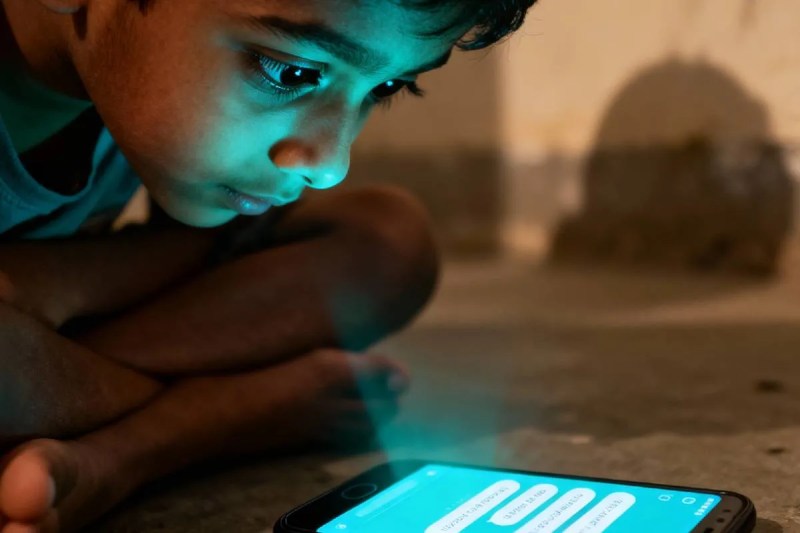
Mobile Addiction in Children (Image: Perplexity)
Mobile Addiction in Children: Mobile addiction and increasing screen time in children are snatching away their childhood. Today, there is hardly any household where children are untouched by the allure of smartphones.
A McAfee study revealed that 83% of children in the country aged 10-14 use smartphones, which is seven percent higher than the global average of 76%. The increasing intrusion of mobile phones into children's daily routines is not only isolating them from their loved ones but also making them mentally irritable and unwell.
The increasing addiction to mobile screens among children has become a major concern for parents today. Unique and creative experiments are being conducted in many parts of the country to help children break free from this digital dependency. Some are running 'No Screen Day' campaigns, while others are engaging children in outdoor games. Teachers are adopting interesting teaching methods to steer children away from mobile dependency. Let's take a look at some such unusual experiments across the country.
The trend of Family Game Nights has increased in cities like Kolkata, Delhi, and Indore. On one day of the week, the entire family puts away their mobile phones and engages in board games, quizzes, and storytelling sessions.
Some schools in Delhi, Pune, and Bengaluru have declared one day a week as 'No Screen Day'. On this day, children participate in outdoor games, crafts, or reading and writing activities instead of using mobiles and tablets.
Some schools have initiated a 'Mobile Bank' initiative. In this, children's mobile phones are collected and deposited before they enter the classroom. However, carrying mobile phones is prohibited in most schools.
In Bengaluru, the Karnataka government, AIGF, and a healthcare company have launched the 'Beyond Screen Digital Detox' campaign. Its aim is to reduce digital dependency among children and youth and provide counselling facilities for mental health. Additionally, NIMHANS (National Institute of Mental Health and Neurosciences) is organising 'Excessive Gaming and Screen Time Workshops' for parents. These workshops explain how to understand children's digital behaviour and transform it into healthy habits.
The 650 children at Vinoba Bhave PE Centre School in Rajkot are given different tasks each week. Topics such as decoration or 'Best from Waste' are assigned. This fosters creativity in children and keeps them away from using mobile phones. They are also encouraged with rewards every week.
The Karnataka government has issued guidelines to set screen time limits during online education. Now, online classes for primary grades are not permitted for more than 30 minutes.
Meenakshi Sukhwal from Jaipur says, "Our children were victims of mobile addiction. After this, we fixed a time for everyone to use mobile phones at home. We play indoor and outdoor games with the children. We encourage the children to listen to stories and read books. Now the children are happy staying away from mobile phones."
Varsha Soni from Burhanpur, Madhya Pradesh, adopted creative methods to keep children away from mobile phones. She involved children in activities like painting, crafts, and dance, and also distanced herself from mobile phones. She kept her daughter Neeba and son Barnit away from mobiles by introducing a competitive spirit even during mealtimes.
Surat. Pravesh Bhutada from a society in the Godadara area said that a few years ago, even during Navratri and Ganesh Utsav, the children of the society were busy with mobile phones at home. After this, we started interesting competitions for them. Now, other societies are also organising similar events, and children are getting involved.
Shobha Mishra, a teacher at Shaskiya Ravishankar School in Sagar, has started a 'No Mobile' initiative. Children are kept busy with various cultural activities including drawing and painting. Various competitions are also organised to keep them engaged at home. As a result, children who used to spend a lot of time on mobile phones have distanced themselves from it.
Avinash Mishra, a teacher from Jaipur, said, "We engage children in sports, painting, storytelling, and group projects. This encourages children to discuss among themselves and enhances their thinking. Creative tasks are also given for home, so that children can complete them using their minds without using a mobile. These methods have proven effective, and children are now maintaining a distance from mobile phones."
October 6, 2025: A 16-year-old teenager committed suicide in Sabang, West Bengal, due to not being given a mobile phone.
October 2, 2025: A 15-year-old teenager committed suicide in Lalbagh, Delhi, after an argument with his sister over a mobile game.
August 4, 2025: A 17-year-old student committed suicide in Dhamtari, Chhattisgarh, for not being given a mobile phone.
August 1, 2025: A 13-year-old teenager died in Indore after losing money in a mobile game.
"Excessive screen time is detrimental to both studies and health. After playing violent games and viewing objectionable content on mobile, a child prefers to be alone. They get annoyed over small things. They get angry or try to break things when their mobile is taken away. Creative initiatives should be taken to help quit mobile addiction." - Sunita Sharma, Child Psychology Expert
Published on:
12 Oct 2025 12:25 pm
Big News
View AllPatrika Special
Trending

